Self-reflection on Digital Marketing Placement Experience at UCB
VerifiedAdded on 2020/11/09
|16
|5184
|56
Report
AI Summary
This report provides a comprehensive self-reflection on a digital marketing placement experience at UCB's Moss House Gym. The introduction highlights the importance of work experience and the aims of the placement, which focused on gaining digital marketing knowledge and enhancing employability. The report details the background of the gym and the goals set for the placement, including content creation and brand awareness. The discussion section includes an analysis of the gym manager's leadership style, identifying strengths in communication and problem-solving, but also weaknesses in technical skills and relationship-oriented leadership. A critical incident is analyzed using Gibbs' reflective cycle, exploring feelings, evaluations, and action plans. The reflection emphasizes the importance of communication and adapting approaches to meet expectations. The report also discusses future development plans and concludes with a summary of the key takeaways from the placement, emphasizing the value of work-based learning in developing practical skills and career management.
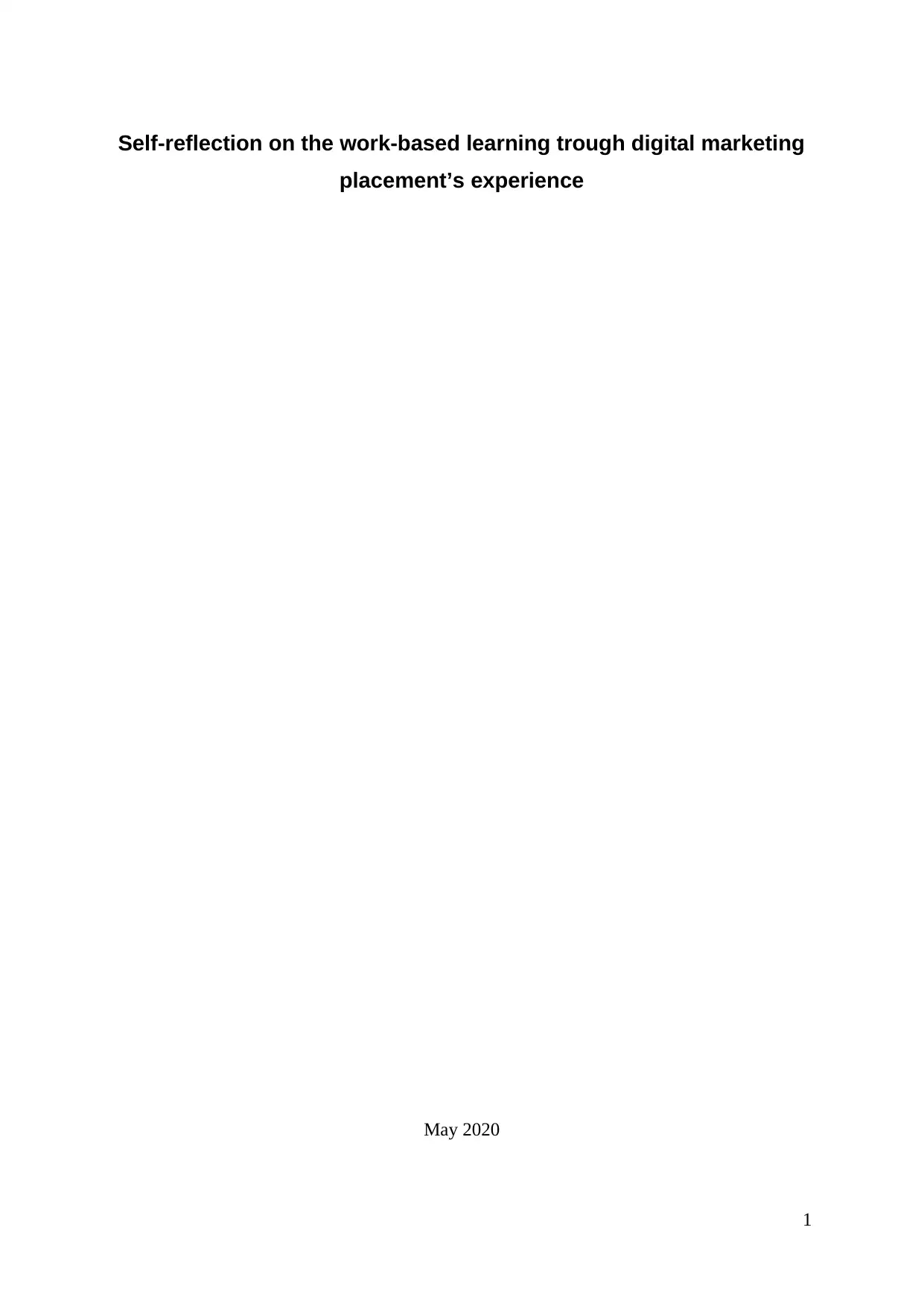
Self-reflection on the work-based learning trough digital marketing
placement’s experience
May 2020
1
placement’s experience
May 2020
1
Paraphrase This Document
Need a fresh take? Get an instant paraphrase of this document with our AI Paraphraser
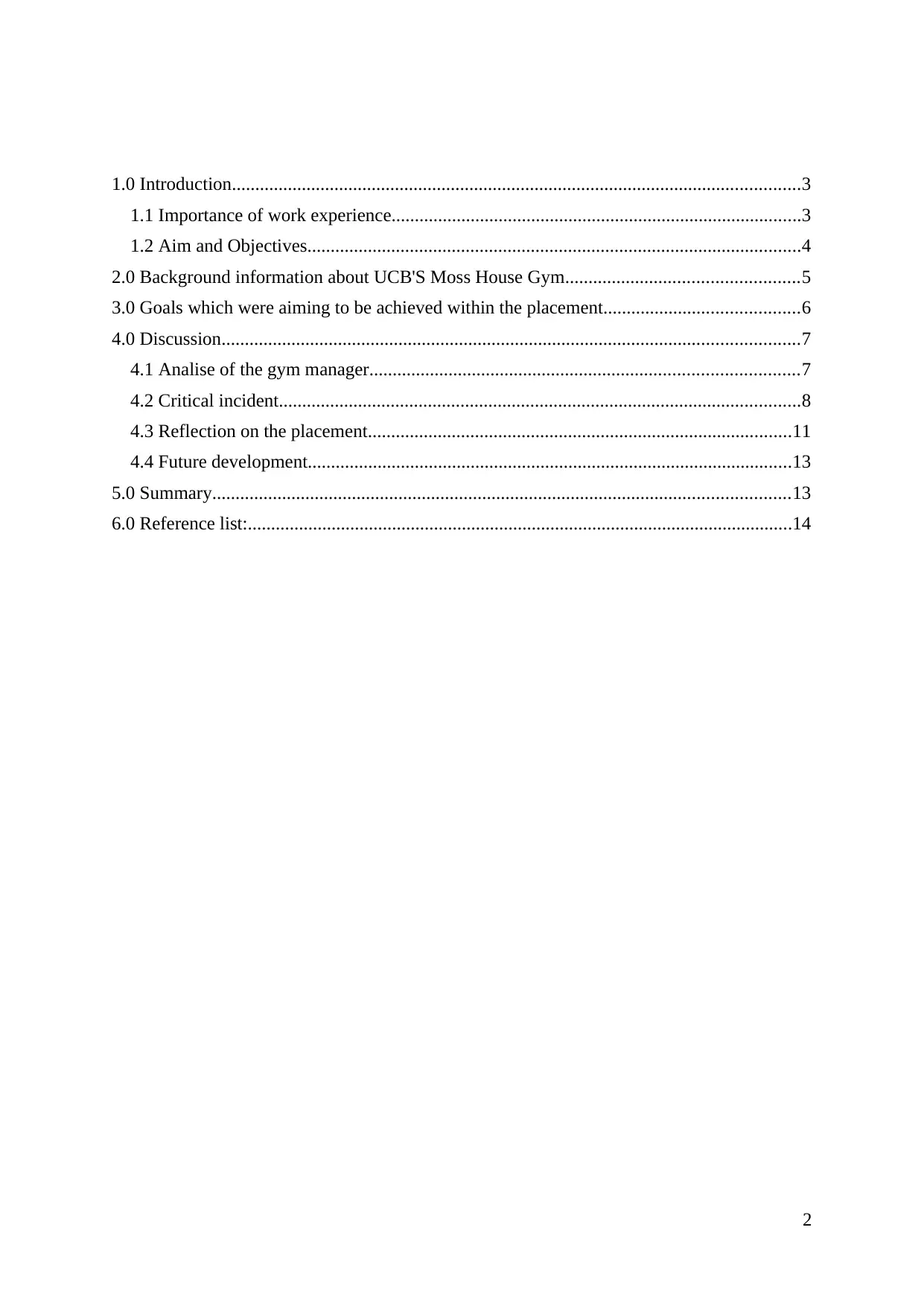
1.0 Introduction..........................................................................................................................3
1.1 Importance of work experience........................................................................................3
1.2 Aim and Objectives..........................................................................................................4
2.0 Background information about UCB'S Moss House Gym..................................................5
3.0 Goals which were aiming to be achieved within the placement..........................................6
4.0 Discussion............................................................................................................................7
4.1 Analise of the gym manager............................................................................................7
4.2 Critical incident................................................................................................................8
4.3 Reflection on the placement...........................................................................................11
4.4 Future development........................................................................................................13
5.0 Summary............................................................................................................................13
6.0 Reference list:.....................................................................................................................14
2
1.1 Importance of work experience........................................................................................3
1.2 Aim and Objectives..........................................................................................................4
2.0 Background information about UCB'S Moss House Gym..................................................5
3.0 Goals which were aiming to be achieved within the placement..........................................6
4.0 Discussion............................................................................................................................7
4.1 Analise of the gym manager............................................................................................7
4.2 Critical incident................................................................................................................8
4.3 Reflection on the placement...........................................................................................11
4.4 Future development........................................................................................................13
5.0 Summary............................................................................................................................13
6.0 Reference list:.....................................................................................................................14
2
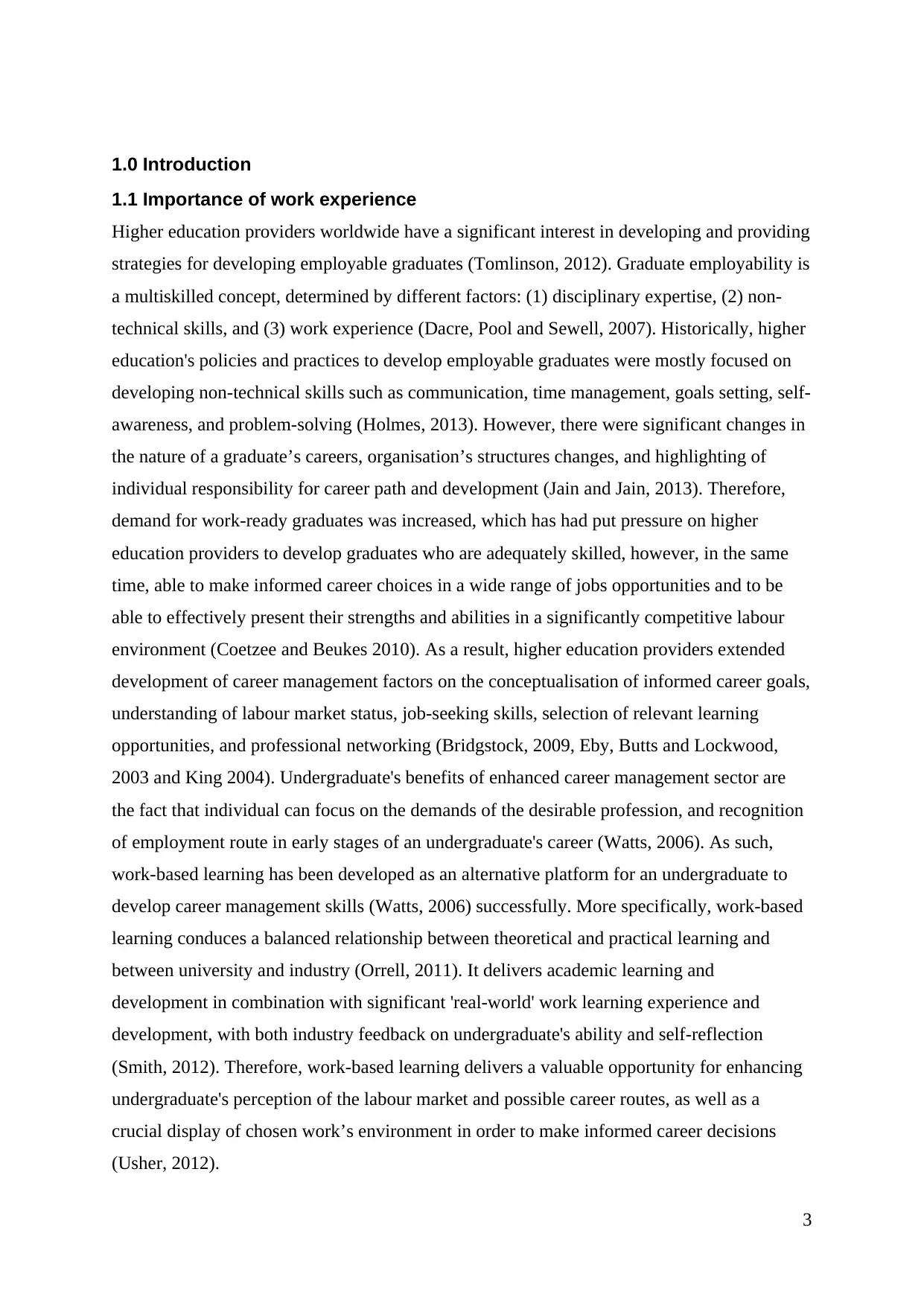
1.0 Introduction
1.1 Importance of work experience
Higher education providers worldwide have a significant interest in developing and providing
strategies for developing employable graduates (Tomlinson, 2012). Graduate employability is
a multiskilled concept, determined by different factors: (1) disciplinary expertise, (2) non-
technical skills, and (3) work experience (Dacre, Pool and Sewell, 2007). Historically, higher
education's policies and practices to develop employable graduates were mostly focused on
developing non-technical skills such as communication, time management, goals setting, self-
awareness, and problem-solving (Holmes, 2013). However, there were significant changes in
the nature of a graduate’s careers, organisation’s structures changes, and highlighting of
individual responsibility for career path and development (Jain and Jain, 2013). Therefore,
demand for work-ready graduates was increased, which has had put pressure on higher
education providers to develop graduates who are adequately skilled, however, in the same
time, able to make informed career choices in a wide range of jobs opportunities and to be
able to effectively present their strengths and abilities in a significantly competitive labour
environment (Coetzee and Beukes 2010). As a result, higher education providers extended
development of career management factors on the conceptualisation of informed career goals,
understanding of labour market status, job-seeking skills, selection of relevant learning
opportunities, and professional networking (Bridgstock, 2009, Eby, Butts and Lockwood,
2003 and King 2004). Undergraduate's benefits of enhanced career management sector are
the fact that individual can focus on the demands of the desirable profession, and recognition
of employment route in early stages of an undergraduate's career (Watts, 2006). As such,
work-based learning has been developed as an alternative platform for an undergraduate to
develop career management skills (Watts, 2006) successfully. More specifically, work-based
learning conduces a balanced relationship between theoretical and practical learning and
between university and industry (Orrell, 2011). It delivers academic learning and
development in combination with significant 'real-world' work learning experience and
development, with both industry feedback on undergraduate's ability and self-reflection
(Smith, 2012). Therefore, work-based learning delivers a valuable opportunity for enhancing
undergraduate's perception of the labour market and possible career routes, as well as a
crucial display of chosen work’s environment in order to make informed career decisions
(Usher, 2012).
3
1.1 Importance of work experience
Higher education providers worldwide have a significant interest in developing and providing
strategies for developing employable graduates (Tomlinson, 2012). Graduate employability is
a multiskilled concept, determined by different factors: (1) disciplinary expertise, (2) non-
technical skills, and (3) work experience (Dacre, Pool and Sewell, 2007). Historically, higher
education's policies and practices to develop employable graduates were mostly focused on
developing non-technical skills such as communication, time management, goals setting, self-
awareness, and problem-solving (Holmes, 2013). However, there were significant changes in
the nature of a graduate’s careers, organisation’s structures changes, and highlighting of
individual responsibility for career path and development (Jain and Jain, 2013). Therefore,
demand for work-ready graduates was increased, which has had put pressure on higher
education providers to develop graduates who are adequately skilled, however, in the same
time, able to make informed career choices in a wide range of jobs opportunities and to be
able to effectively present their strengths and abilities in a significantly competitive labour
environment (Coetzee and Beukes 2010). As a result, higher education providers extended
development of career management factors on the conceptualisation of informed career goals,
understanding of labour market status, job-seeking skills, selection of relevant learning
opportunities, and professional networking (Bridgstock, 2009, Eby, Butts and Lockwood,
2003 and King 2004). Undergraduate's benefits of enhanced career management sector are
the fact that individual can focus on the demands of the desirable profession, and recognition
of employment route in early stages of an undergraduate's career (Watts, 2006). As such,
work-based learning has been developed as an alternative platform for an undergraduate to
develop career management skills (Watts, 2006) successfully. More specifically, work-based
learning conduces a balanced relationship between theoretical and practical learning and
between university and industry (Orrell, 2011). It delivers academic learning and
development in combination with significant 'real-world' work learning experience and
development, with both industry feedback on undergraduate's ability and self-reflection
(Smith, 2012). Therefore, work-based learning delivers a valuable opportunity for enhancing
undergraduate's perception of the labour market and possible career routes, as well as a
crucial display of chosen work’s environment in order to make informed career decisions
(Usher, 2012).
3
⊘ This is a preview!⊘
Do you want full access?
Subscribe today to unlock all pages.

Trusted by 1+ million students worldwide
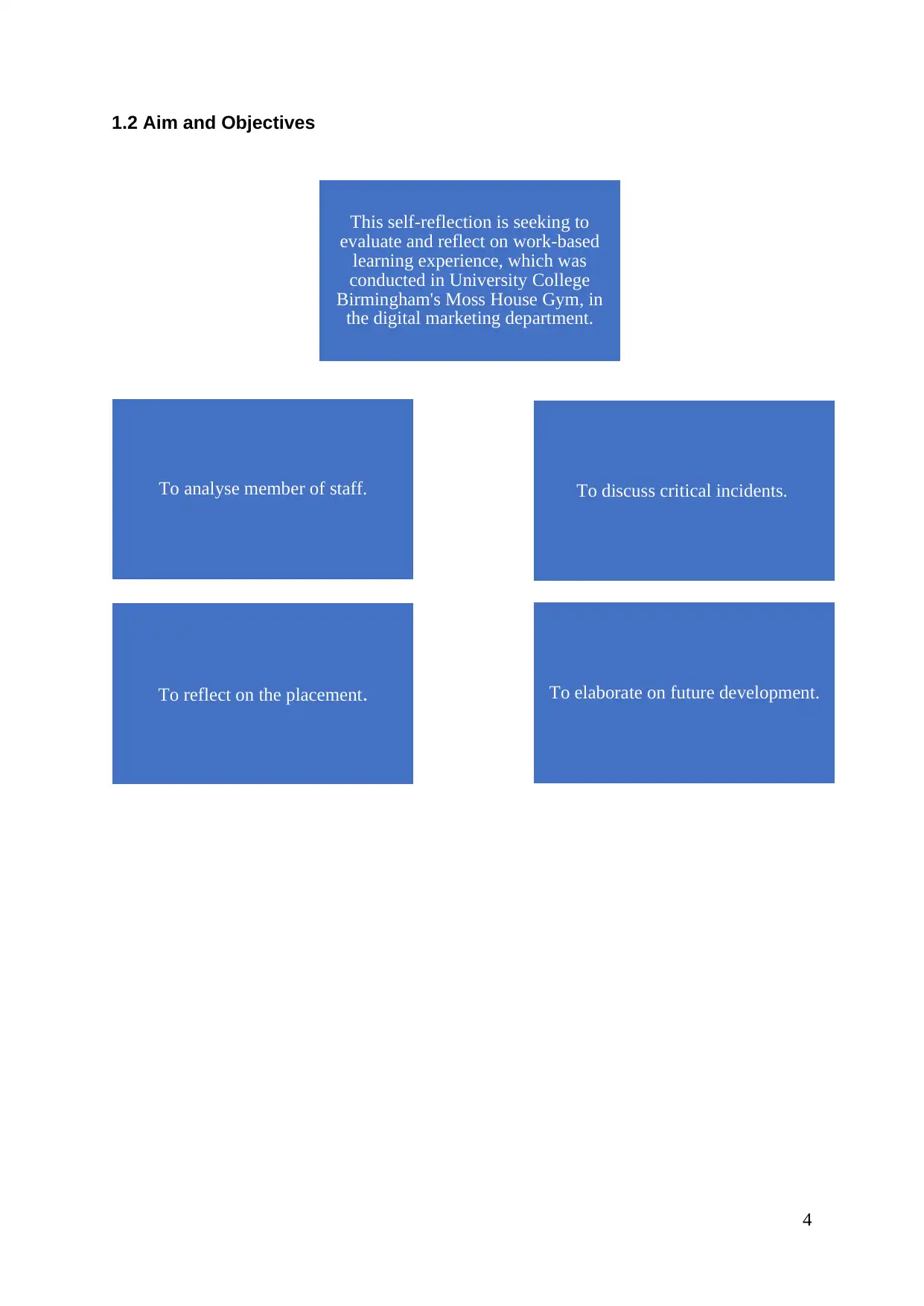
1.2 Aim and Objectives
4
This self-reflection is seeking to
evaluate and reflect on work-based
learning experience, which was
conducted in University College
Birmingham's Moss House Gym, in
the digital marketing department.
To discuss critical incidents.To analyse member of staff.
To elaborate on future development.To reflect on the placement .
4
This self-reflection is seeking to
evaluate and reflect on work-based
learning experience, which was
conducted in University College
Birmingham's Moss House Gym, in
the digital marketing department.
To discuss critical incidents.To analyse member of staff.
To elaborate on future development.To reflect on the placement .
Paraphrase This Document
Need a fresh take? Get an instant paraphrase of this document with our AI Paraphraser
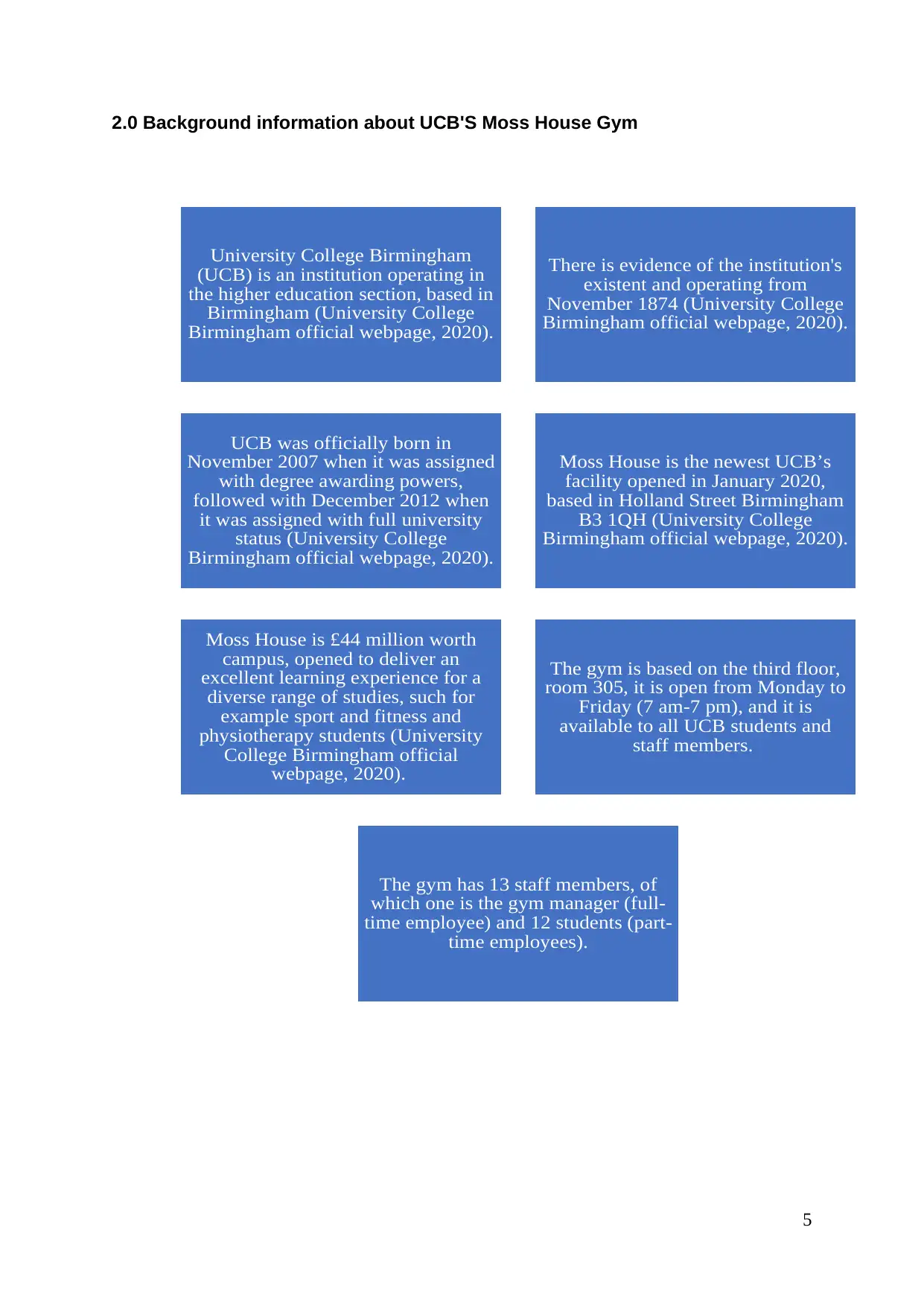
2.0 Background information about UCB'S Moss House Gym
5
University College Birmingham
(UCB) is an institution operating in
the higher education section, based in
Birmingham (University College
Birmingham official webpage, 2020).
There is evidence of the institution's
existent and operating from
November 1874 (University College
Birmingham official webpage, 2020).
UCB was officially born in
November 2007 when it was assigned
with degree awarding powers,
followed with December 2012 when
it was assigned with full university
status (University College
Birmingham official webpage, 2020).
Moss House is the newest UCB’s
facility opened in January 2020,
based in Holland Street Birmingham
B3 1QH (University College
Birmingham official webpage, 2020).
Moss House is £44 million worth
campus, opened to deliver an
excellent learning experience for a
diverse range of studies, such for
example sport and fitness and
physiotherapy students (University
College Birmingham official
webpage, 2020).
The gym is based on the third floor,
room 305, it is open from Monday to
Friday (7 am-7 pm), and it is
available to all UCB students and
staff members.
The gym has 13 staff members, of
which one is the gym manager (full-
time employee) and 12 students (part-
time employees).
5
University College Birmingham
(UCB) is an institution operating in
the higher education section, based in
Birmingham (University College
Birmingham official webpage, 2020).
There is evidence of the institution's
existent and operating from
November 1874 (University College
Birmingham official webpage, 2020).
UCB was officially born in
November 2007 when it was assigned
with degree awarding powers,
followed with December 2012 when
it was assigned with full university
status (University College
Birmingham official webpage, 2020).
Moss House is the newest UCB’s
facility opened in January 2020,
based in Holland Street Birmingham
B3 1QH (University College
Birmingham official webpage, 2020).
Moss House is £44 million worth
campus, opened to deliver an
excellent learning experience for a
diverse range of studies, such for
example sport and fitness and
physiotherapy students (University
College Birmingham official
webpage, 2020).
The gym is based on the third floor,
room 305, it is open from Monday to
Friday (7 am-7 pm), and it is
available to all UCB students and
staff members.
The gym has 13 staff members, of
which one is the gym manager (full-
time employee) and 12 students (part-
time employees).
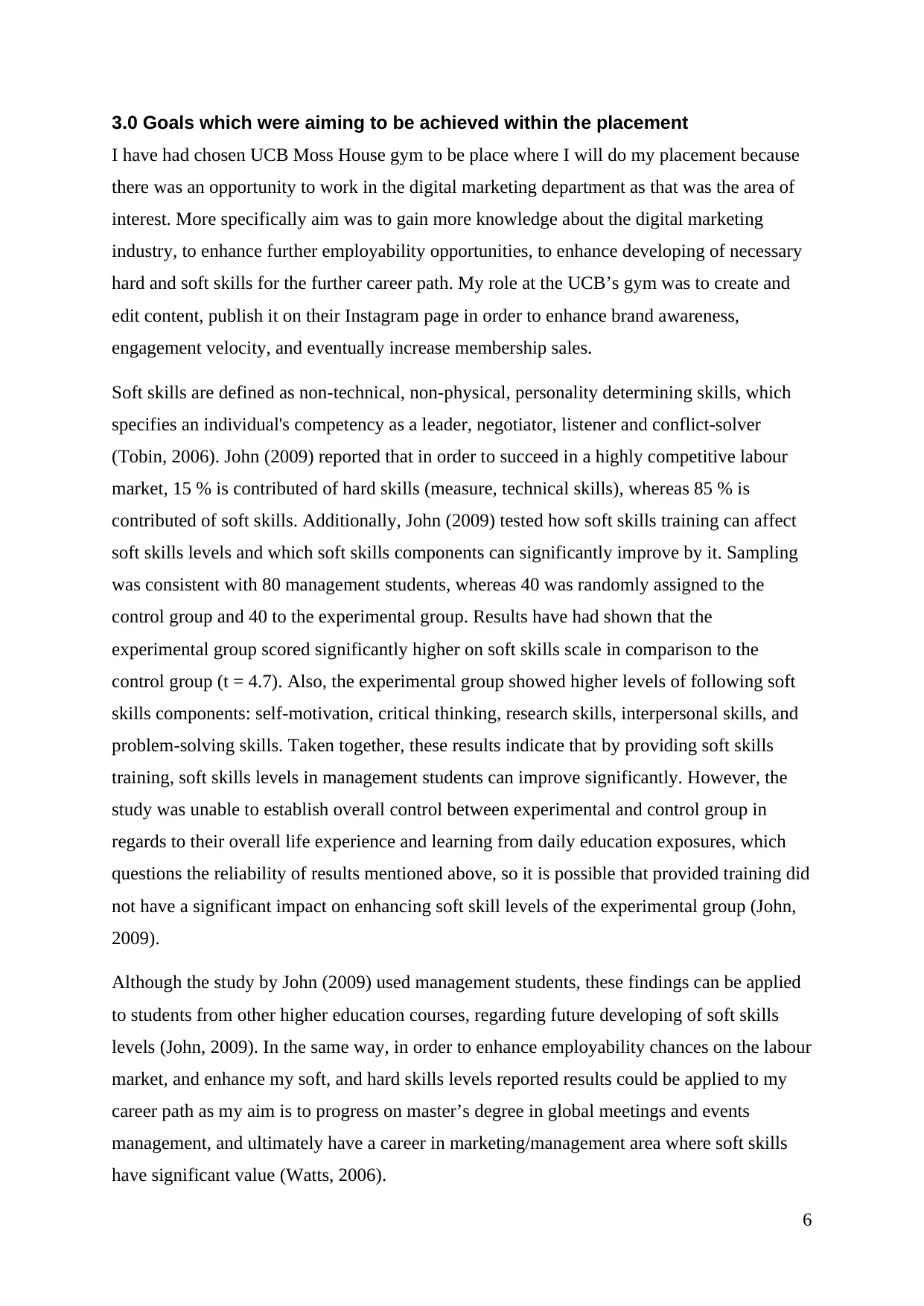
3.0 Goals which were aiming to be achieved within the placement
I have had chosen UCB Moss House gym to be place where I will do my placement because
there was an opportunity to work in the digital marketing department as that was the area of
interest. More specifically aim was to gain more knowledge about the digital marketing
industry, to enhance further employability opportunities, to enhance developing of necessary
hard and soft skills for the further career path. My role at the UCB’s gym was to create and
edit content, publish it on their Instagram page in order to enhance brand awareness,
engagement velocity, and eventually increase membership sales.
Soft skills are defined as non-technical, non-physical, personality determining skills, which
specifies an individual's competency as a leader, negotiator, listener and conflict-solver
(Tobin, 2006). John (2009) reported that in order to succeed in a highly competitive labour
market, 15 % is contributed of hard skills (measure, technical skills), whereas 85 % is
contributed of soft skills. Additionally, John (2009) tested how soft skills training can affect
soft skills levels and which soft skills components can significantly improve by it. Sampling
was consistent with 80 management students, whereas 40 was randomly assigned to the
control group and 40 to the experimental group. Results have had shown that the
experimental group scored significantly higher on soft skills scale in comparison to the
control group (t = 4.7). Also, the experimental group showed higher levels of following soft
skills components: self-motivation, critical thinking, research skills, interpersonal skills, and
problem-solving skills. Taken together, these results indicate that by providing soft skills
training, soft skills levels in management students can improve significantly. However, the
study was unable to establish overall control between experimental and control group in
regards to their overall life experience and learning from daily education exposures, which
questions the reliability of results mentioned above, so it is possible that provided training did
not have a significant impact on enhancing soft skill levels of the experimental group (John,
2009).
Although the study by John (2009) used management students, these findings can be applied
to students from other higher education courses, regarding future developing of soft skills
levels (John, 2009). In the same way, in order to enhance employability chances on the labour
market, and enhance my soft, and hard skills levels reported results could be applied to my
career path as my aim is to progress on master’s degree in global meetings and events
management, and ultimately have a career in marketing/management area where soft skills
have significant value (Watts, 2006).
6
I have had chosen UCB Moss House gym to be place where I will do my placement because
there was an opportunity to work in the digital marketing department as that was the area of
interest. More specifically aim was to gain more knowledge about the digital marketing
industry, to enhance further employability opportunities, to enhance developing of necessary
hard and soft skills for the further career path. My role at the UCB’s gym was to create and
edit content, publish it on their Instagram page in order to enhance brand awareness,
engagement velocity, and eventually increase membership sales.
Soft skills are defined as non-technical, non-physical, personality determining skills, which
specifies an individual's competency as a leader, negotiator, listener and conflict-solver
(Tobin, 2006). John (2009) reported that in order to succeed in a highly competitive labour
market, 15 % is contributed of hard skills (measure, technical skills), whereas 85 % is
contributed of soft skills. Additionally, John (2009) tested how soft skills training can affect
soft skills levels and which soft skills components can significantly improve by it. Sampling
was consistent with 80 management students, whereas 40 was randomly assigned to the
control group and 40 to the experimental group. Results have had shown that the
experimental group scored significantly higher on soft skills scale in comparison to the
control group (t = 4.7). Also, the experimental group showed higher levels of following soft
skills components: self-motivation, critical thinking, research skills, interpersonal skills, and
problem-solving skills. Taken together, these results indicate that by providing soft skills
training, soft skills levels in management students can improve significantly. However, the
study was unable to establish overall control between experimental and control group in
regards to their overall life experience and learning from daily education exposures, which
questions the reliability of results mentioned above, so it is possible that provided training did
not have a significant impact on enhancing soft skill levels of the experimental group (John,
2009).
Although the study by John (2009) used management students, these findings can be applied
to students from other higher education courses, regarding future developing of soft skills
levels (John, 2009). In the same way, in order to enhance employability chances on the labour
market, and enhance my soft, and hard skills levels reported results could be applied to my
career path as my aim is to progress on master’s degree in global meetings and events
management, and ultimately have a career in marketing/management area where soft skills
have significant value (Watts, 2006).
6
⊘ This is a preview!⊘
Do you want full access?
Subscribe today to unlock all pages.

Trusted by 1+ million students worldwide
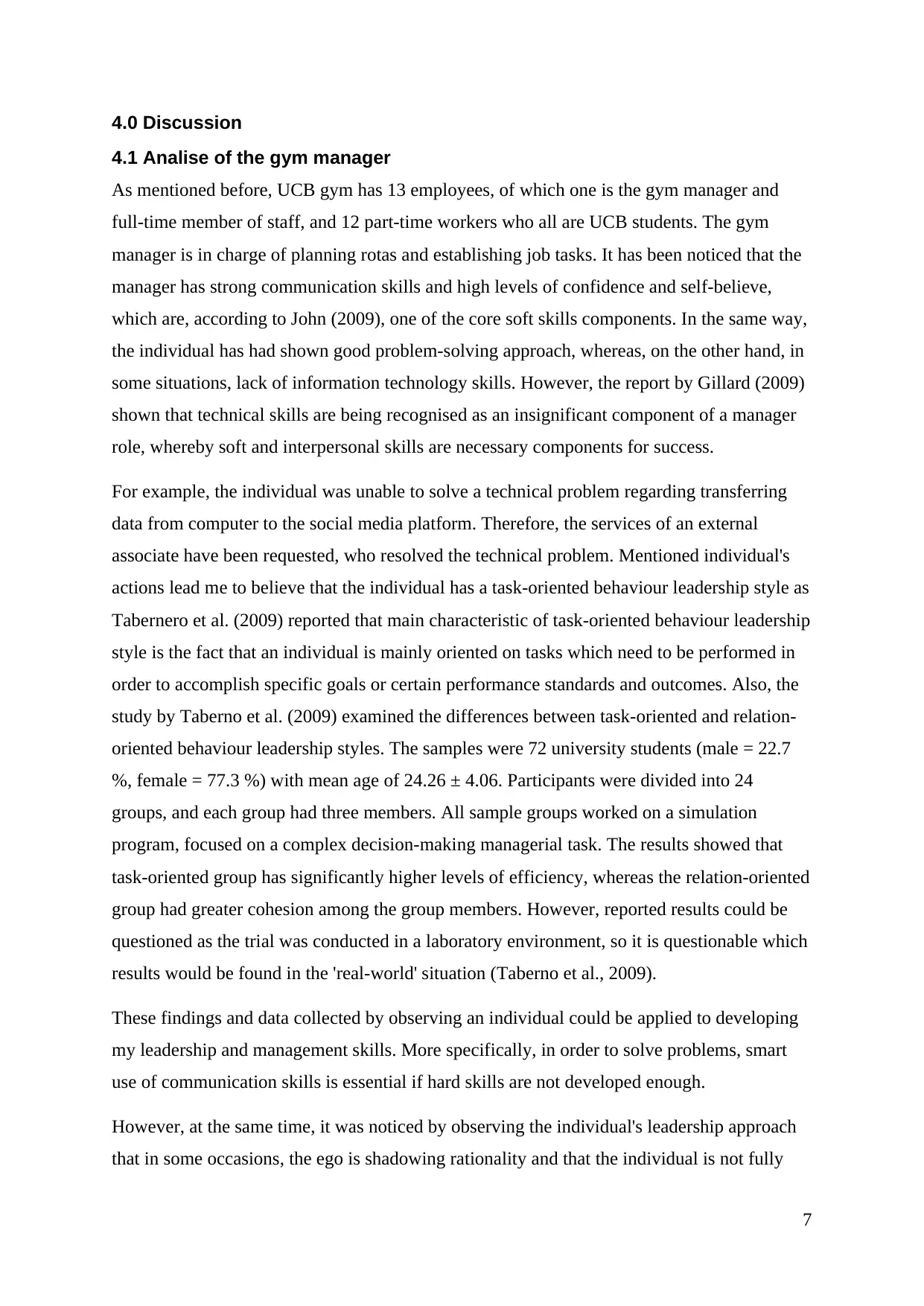
4.0 Discussion
4.1 Analise of the gym manager
As mentioned before, UCB gym has 13 employees, of which one is the gym manager and
full-time member of staff, and 12 part-time workers who all are UCB students. The gym
manager is in charge of planning rotas and establishing job tasks. It has been noticed that the
manager has strong communication skills and high levels of confidence and self-believe,
which are, according to John (2009), one of the core soft skills components. In the same way,
the individual has had shown good problem-solving approach, whereas, on the other hand, in
some situations, lack of information technology skills. However, the report by Gillard (2009)
shown that technical skills are being recognised as an insignificant component of a manager
role, whereby soft and interpersonal skills are necessary components for success.
For example, the individual was unable to solve a technical problem regarding transferring
data from computer to the social media platform. Therefore, the services of an external
associate have been requested, who resolved the technical problem. Mentioned individual's
actions lead me to believe that the individual has a task-oriented behaviour leadership style as
Tabernero et al. (2009) reported that main characteristic of task-oriented behaviour leadership
style is the fact that an individual is mainly oriented on tasks which need to be performed in
order to accomplish specific goals or certain performance standards and outcomes. Also, the
study by Taberno et al. (2009) examined the differences between task-oriented and relation-
oriented behaviour leadership styles. The samples were 72 university students (male = 22.7
%, female = 77.3 %) with mean age of 24.26 ± 4.06. Participants were divided into 24
groups, and each group had three members. All sample groups worked on a simulation
program, focused on a complex decision-making managerial task. The results showed that
task-oriented group has significantly higher levels of efficiency, whereas the relation-oriented
group had greater cohesion among the group members. However, reported results could be
questioned as the trial was conducted in a laboratory environment, so it is questionable which
results would be found in the 'real-world' situation (Taberno et al., 2009).
These findings and data collected by observing an individual could be applied to developing
my leadership and management skills. More specifically, in order to solve problems, smart
use of communication skills is essential if hard skills are not developed enough.
However, at the same time, it was noticed by observing the individual's leadership approach
that in some occasions, the ego is shadowing rationality and that the individual is not fully
7
4.1 Analise of the gym manager
As mentioned before, UCB gym has 13 employees, of which one is the gym manager and
full-time member of staff, and 12 part-time workers who all are UCB students. The gym
manager is in charge of planning rotas and establishing job tasks. It has been noticed that the
manager has strong communication skills and high levels of confidence and self-believe,
which are, according to John (2009), one of the core soft skills components. In the same way,
the individual has had shown good problem-solving approach, whereas, on the other hand, in
some situations, lack of information technology skills. However, the report by Gillard (2009)
shown that technical skills are being recognised as an insignificant component of a manager
role, whereby soft and interpersonal skills are necessary components for success.
For example, the individual was unable to solve a technical problem regarding transferring
data from computer to the social media platform. Therefore, the services of an external
associate have been requested, who resolved the technical problem. Mentioned individual's
actions lead me to believe that the individual has a task-oriented behaviour leadership style as
Tabernero et al. (2009) reported that main characteristic of task-oriented behaviour leadership
style is the fact that an individual is mainly oriented on tasks which need to be performed in
order to accomplish specific goals or certain performance standards and outcomes. Also, the
study by Taberno et al. (2009) examined the differences between task-oriented and relation-
oriented behaviour leadership styles. The samples were 72 university students (male = 22.7
%, female = 77.3 %) with mean age of 24.26 ± 4.06. Participants were divided into 24
groups, and each group had three members. All sample groups worked on a simulation
program, focused on a complex decision-making managerial task. The results showed that
task-oriented group has significantly higher levels of efficiency, whereas the relation-oriented
group had greater cohesion among the group members. However, reported results could be
questioned as the trial was conducted in a laboratory environment, so it is questionable which
results would be found in the 'real-world' situation (Taberno et al., 2009).
These findings and data collected by observing an individual could be applied to developing
my leadership and management skills. More specifically, in order to solve problems, smart
use of communication skills is essential if hard skills are not developed enough.
However, at the same time, it was noticed by observing the individual's leadership approach
that in some occasions, the ego is shadowing rationality and that the individual is not fully
7
Paraphrase This Document
Need a fresh take? Get an instant paraphrase of this document with our AI Paraphraser
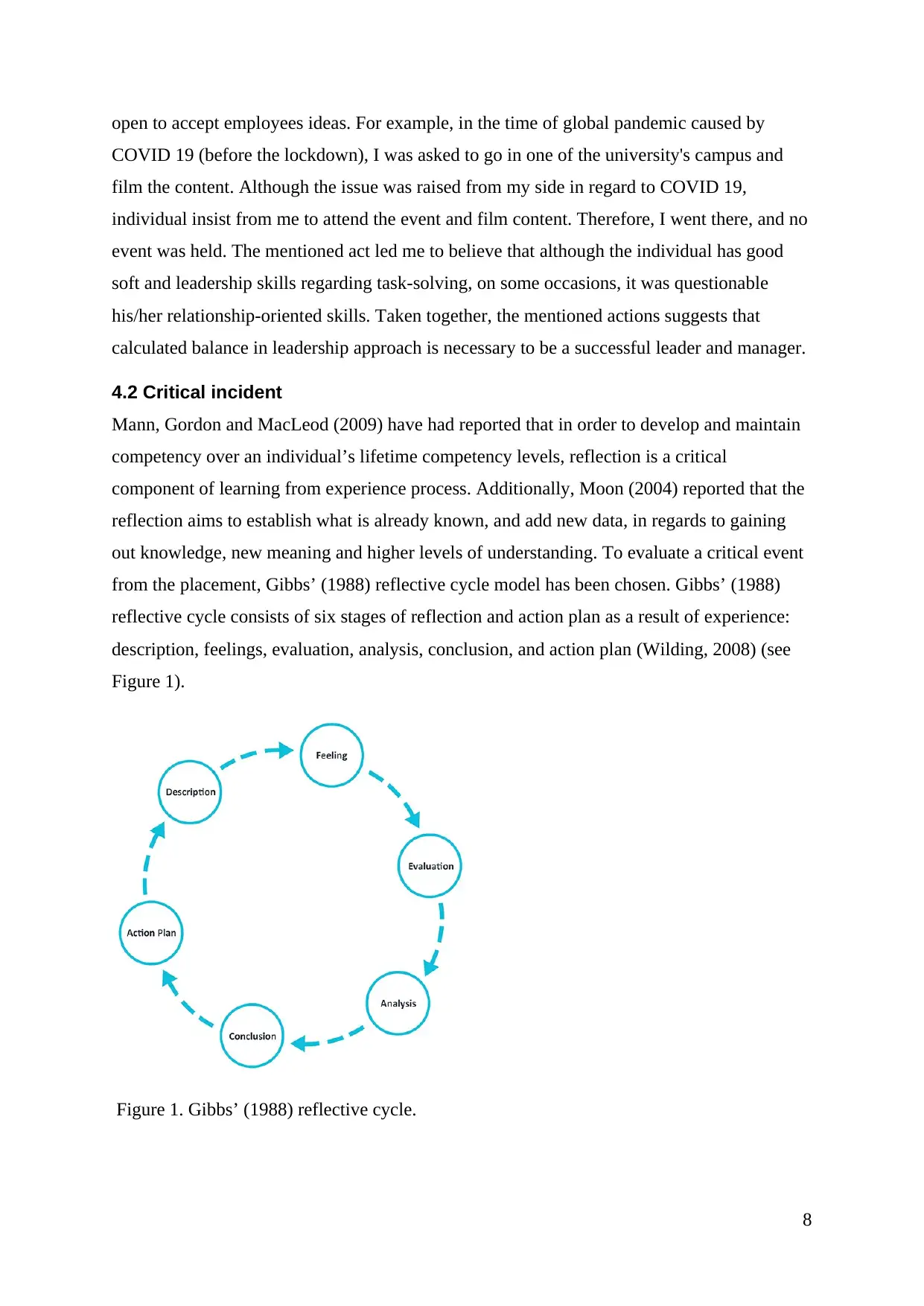
open to accept employees ideas. For example, in the time of global pandemic caused by
COVID 19 (before the lockdown), I was asked to go in one of the university's campus and
film the content. Although the issue was raised from my side in regard to COVID 19,
individual insist from me to attend the event and film content. Therefore, I went there, and no
event was held. The mentioned act led me to believe that although the individual has good
soft and leadership skills regarding task-solving, on some occasions, it was questionable
his/her relationship-oriented skills. Taken together, the mentioned actions suggests that
calculated balance in leadership approach is necessary to be a successful leader and manager.
4.2 Critical incident
Mann, Gordon and MacLeod (2009) have had reported that in order to develop and maintain
competency over an individual’s lifetime competency levels, reflection is a critical
component of learning from experience process. Additionally, Moon (2004) reported that the
reflection aims to establish what is already known, and add new data, in regards to gaining
out knowledge, new meaning and higher levels of understanding. To evaluate a critical event
from the placement, Gibbs’ (1988) reflective cycle model has been chosen. Gibbs’ (1988)
reflective cycle consists of six stages of reflection and action plan as a result of experience:
description, feelings, evaluation, analysis, conclusion, and action plan (Wilding, 2008) (see
Figure 1).
Figure 1. Gibbs’ (1988) reflective cycle.
8
COVID 19 (before the lockdown), I was asked to go in one of the university's campus and
film the content. Although the issue was raised from my side in regard to COVID 19,
individual insist from me to attend the event and film content. Therefore, I went there, and no
event was held. The mentioned act led me to believe that although the individual has good
soft and leadership skills regarding task-solving, on some occasions, it was questionable
his/her relationship-oriented skills. Taken together, the mentioned actions suggests that
calculated balance in leadership approach is necessary to be a successful leader and manager.
4.2 Critical incident
Mann, Gordon and MacLeod (2009) have had reported that in order to develop and maintain
competency over an individual’s lifetime competency levels, reflection is a critical
component of learning from experience process. Additionally, Moon (2004) reported that the
reflection aims to establish what is already known, and add new data, in regards to gaining
out knowledge, new meaning and higher levels of understanding. To evaluate a critical event
from the placement, Gibbs’ (1988) reflective cycle model has been chosen. Gibbs’ (1988)
reflective cycle consists of six stages of reflection and action plan as a result of experience:
description, feelings, evaluation, analysis, conclusion, and action plan (Wilding, 2008) (see
Figure 1).
Figure 1. Gibbs’ (1988) reflective cycle.
8
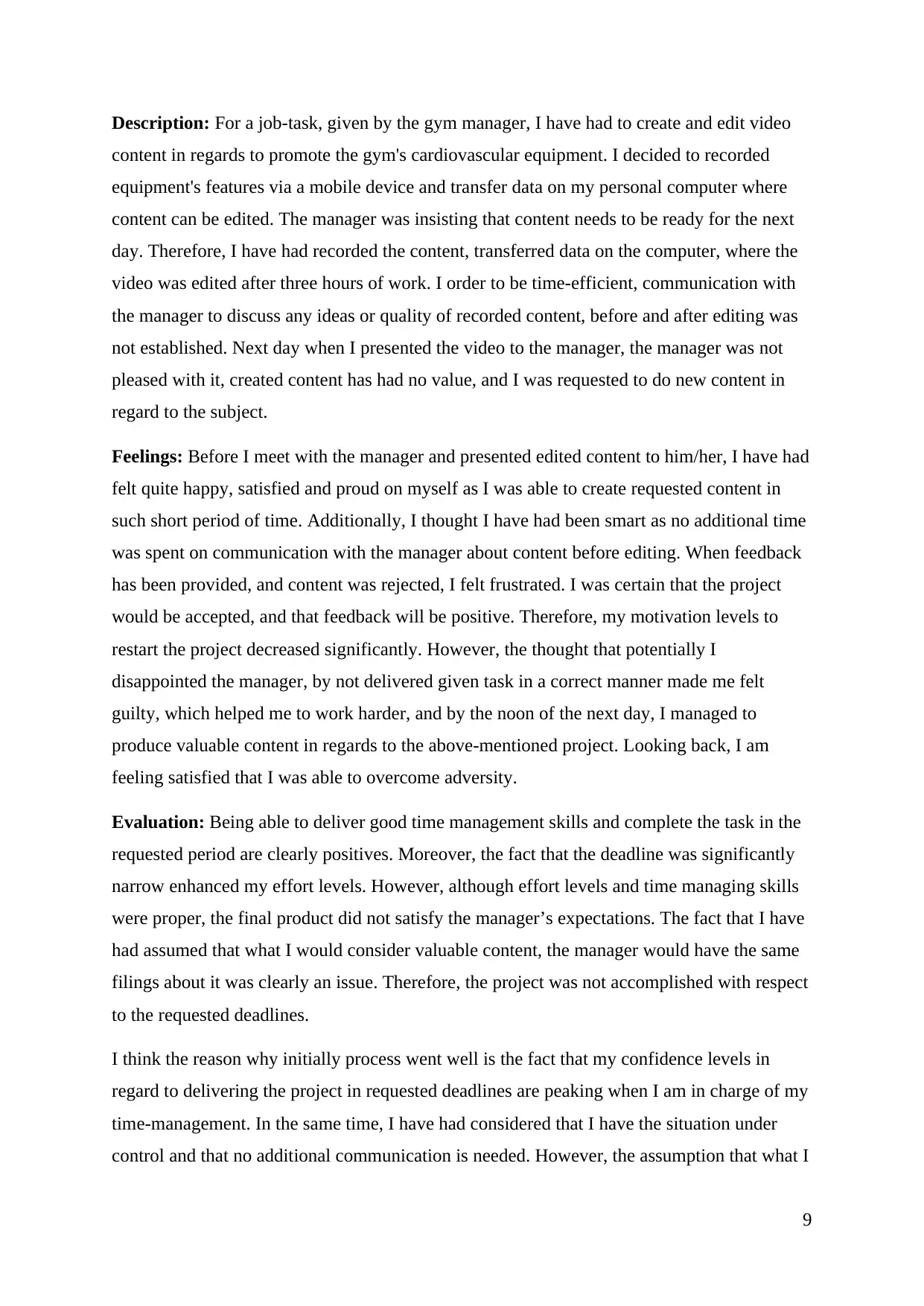
Description: For a job-task, given by the gym manager, I have had to create and edit video
content in regards to promote the gym's cardiovascular equipment. I decided to recorded
equipment's features via a mobile device and transfer data on my personal computer where
content can be edited. The manager was insisting that content needs to be ready for the next
day. Therefore, I have had recorded the content, transferred data on the computer, where the
video was edited after three hours of work. I order to be time-efficient, communication with
the manager to discuss any ideas or quality of recorded content, before and after editing was
not established. Next day when I presented the video to the manager, the manager was not
pleased with it, created content has had no value, and I was requested to do new content in
regard to the subject.
Feelings: Before I meet with the manager and presented edited content to him/her, I have had
felt quite happy, satisfied and proud on myself as I was able to create requested content in
such short period of time. Additionally, I thought I have had been smart as no additional time
was spent on communication with the manager about content before editing. When feedback
has been provided, and content was rejected, I felt frustrated. I was certain that the project
would be accepted, and that feedback will be positive. Therefore, my motivation levels to
restart the project decreased significantly. However, the thought that potentially I
disappointed the manager, by not delivered given task in a correct manner made me felt
guilty, which helped me to work harder, and by the noon of the next day, I managed to
produce valuable content in regards to the above-mentioned project. Looking back, I am
feeling satisfied that I was able to overcome adversity.
Evaluation: Being able to deliver good time management skills and complete the task in the
requested period are clearly positives. Moreover, the fact that the deadline was significantly
narrow enhanced my effort levels. However, although effort levels and time managing skills
were proper, the final product did not satisfy the manager’s expectations. The fact that I have
had assumed that what I would consider valuable content, the manager would have the same
filings about it was clearly an issue. Therefore, the project was not accomplished with respect
to the requested deadlines.
I think the reason why initially process went well is the fact that my confidence levels in
regard to delivering the project in requested deadlines are peaking when I am in charge of my
time-management. In the same time, I have had considered that I have the situation under
control and that no additional communication is needed. However, the assumption that what I
9
content in regards to promote the gym's cardiovascular equipment. I decided to recorded
equipment's features via a mobile device and transfer data on my personal computer where
content can be edited. The manager was insisting that content needs to be ready for the next
day. Therefore, I have had recorded the content, transferred data on the computer, where the
video was edited after three hours of work. I order to be time-efficient, communication with
the manager to discuss any ideas or quality of recorded content, before and after editing was
not established. Next day when I presented the video to the manager, the manager was not
pleased with it, created content has had no value, and I was requested to do new content in
regard to the subject.
Feelings: Before I meet with the manager and presented edited content to him/her, I have had
felt quite happy, satisfied and proud on myself as I was able to create requested content in
such short period of time. Additionally, I thought I have had been smart as no additional time
was spent on communication with the manager about content before editing. When feedback
has been provided, and content was rejected, I felt frustrated. I was certain that the project
would be accepted, and that feedback will be positive. Therefore, my motivation levels to
restart the project decreased significantly. However, the thought that potentially I
disappointed the manager, by not delivered given task in a correct manner made me felt
guilty, which helped me to work harder, and by the noon of the next day, I managed to
produce valuable content in regards to the above-mentioned project. Looking back, I am
feeling satisfied that I was able to overcome adversity.
Evaluation: Being able to deliver good time management skills and complete the task in the
requested period are clearly positives. Moreover, the fact that the deadline was significantly
narrow enhanced my effort levels. However, although effort levels and time managing skills
were proper, the final product did not satisfy the manager’s expectations. The fact that I have
had assumed that what I would consider valuable content, the manager would have the same
filings about it was clearly an issue. Therefore, the project was not accomplished with respect
to the requested deadlines.
I think the reason why initially process went well is the fact that my confidence levels in
regard to delivering the project in requested deadlines are peaking when I am in charge of my
time-management. In the same time, I have had considered that I have the situation under
control and that no additional communication is needed. However, the assumption that what I
9
⊘ This is a preview!⊘
Do you want full access?
Subscribe today to unlock all pages.

Trusted by 1+ million students worldwide
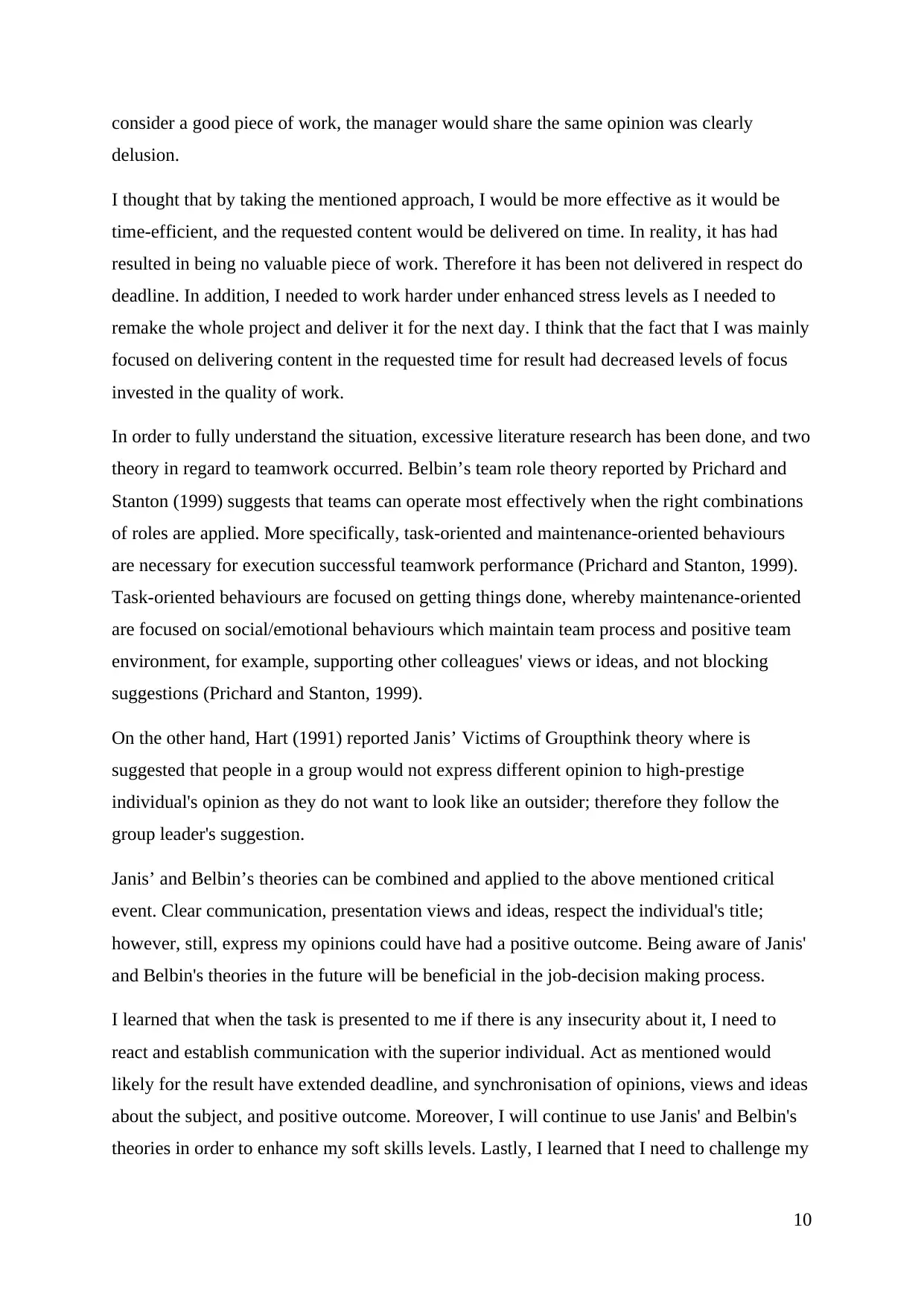
consider a good piece of work, the manager would share the same opinion was clearly
delusion.
I thought that by taking the mentioned approach, I would be more effective as it would be
time-efficient, and the requested content would be delivered on time. In reality, it has had
resulted in being no valuable piece of work. Therefore it has been not delivered in respect do
deadline. In addition, I needed to work harder under enhanced stress levels as I needed to
remake the whole project and deliver it for the next day. I think that the fact that I was mainly
focused on delivering content in the requested time for result had decreased levels of focus
invested in the quality of work.
In order to fully understand the situation, excessive literature research has been done, and two
theory in regard to teamwork occurred. Belbin’s team role theory reported by Prichard and
Stanton (1999) suggests that teams can operate most effectively when the right combinations
of roles are applied. More specifically, task-oriented and maintenance-oriented behaviours
are necessary for execution successful teamwork performance (Prichard and Stanton, 1999).
Task-oriented behaviours are focused on getting things done, whereby maintenance-oriented
are focused on social/emotional behaviours which maintain team process and positive team
environment, for example, supporting other colleagues' views or ideas, and not blocking
suggestions (Prichard and Stanton, 1999).
On the other hand, Hart (1991) reported Janis’ Victims of Groupthink theory where is
suggested that people in a group would not express different opinion to high-prestige
individual's opinion as they do not want to look like an outsider; therefore they follow the
group leader's suggestion.
Janis’ and Belbin’s theories can be combined and applied to the above mentioned critical
event. Clear communication, presentation views and ideas, respect the individual's title;
however, still, express my opinions could have had a positive outcome. Being aware of Janis'
and Belbin's theories in the future will be beneficial in the job-decision making process.
I learned that when the task is presented to me if there is any insecurity about it, I need to
react and establish communication with the superior individual. Act as mentioned would
likely for the result have extended deadline, and synchronisation of opinions, views and ideas
about the subject, and positive outcome. Moreover, I will continue to use Janis' and Belbin's
theories in order to enhance my soft skills levels. Lastly, I learned that I need to challenge my
10
delusion.
I thought that by taking the mentioned approach, I would be more effective as it would be
time-efficient, and the requested content would be delivered on time. In reality, it has had
resulted in being no valuable piece of work. Therefore it has been not delivered in respect do
deadline. In addition, I needed to work harder under enhanced stress levels as I needed to
remake the whole project and deliver it for the next day. I think that the fact that I was mainly
focused on delivering content in the requested time for result had decreased levels of focus
invested in the quality of work.
In order to fully understand the situation, excessive literature research has been done, and two
theory in regard to teamwork occurred. Belbin’s team role theory reported by Prichard and
Stanton (1999) suggests that teams can operate most effectively when the right combinations
of roles are applied. More specifically, task-oriented and maintenance-oriented behaviours
are necessary for execution successful teamwork performance (Prichard and Stanton, 1999).
Task-oriented behaviours are focused on getting things done, whereby maintenance-oriented
are focused on social/emotional behaviours which maintain team process and positive team
environment, for example, supporting other colleagues' views or ideas, and not blocking
suggestions (Prichard and Stanton, 1999).
On the other hand, Hart (1991) reported Janis’ Victims of Groupthink theory where is
suggested that people in a group would not express different opinion to high-prestige
individual's opinion as they do not want to look like an outsider; therefore they follow the
group leader's suggestion.
Janis’ and Belbin’s theories can be combined and applied to the above mentioned critical
event. Clear communication, presentation views and ideas, respect the individual's title;
however, still, express my opinions could have had a positive outcome. Being aware of Janis'
and Belbin's theories in the future will be beneficial in the job-decision making process.
I learned that when the task is presented to me if there is any insecurity about it, I need to
react and establish communication with the superior individual. Act as mentioned would
likely for the result have extended deadline, and synchronisation of opinions, views and ideas
about the subject, and positive outcome. Moreover, I will continue to use Janis' and Belbin's
theories in order to enhance my soft skills levels. Lastly, I learned that I need to challenge my
10
Paraphrase This Document
Need a fresh take? Get an instant paraphrase of this document with our AI Paraphraser
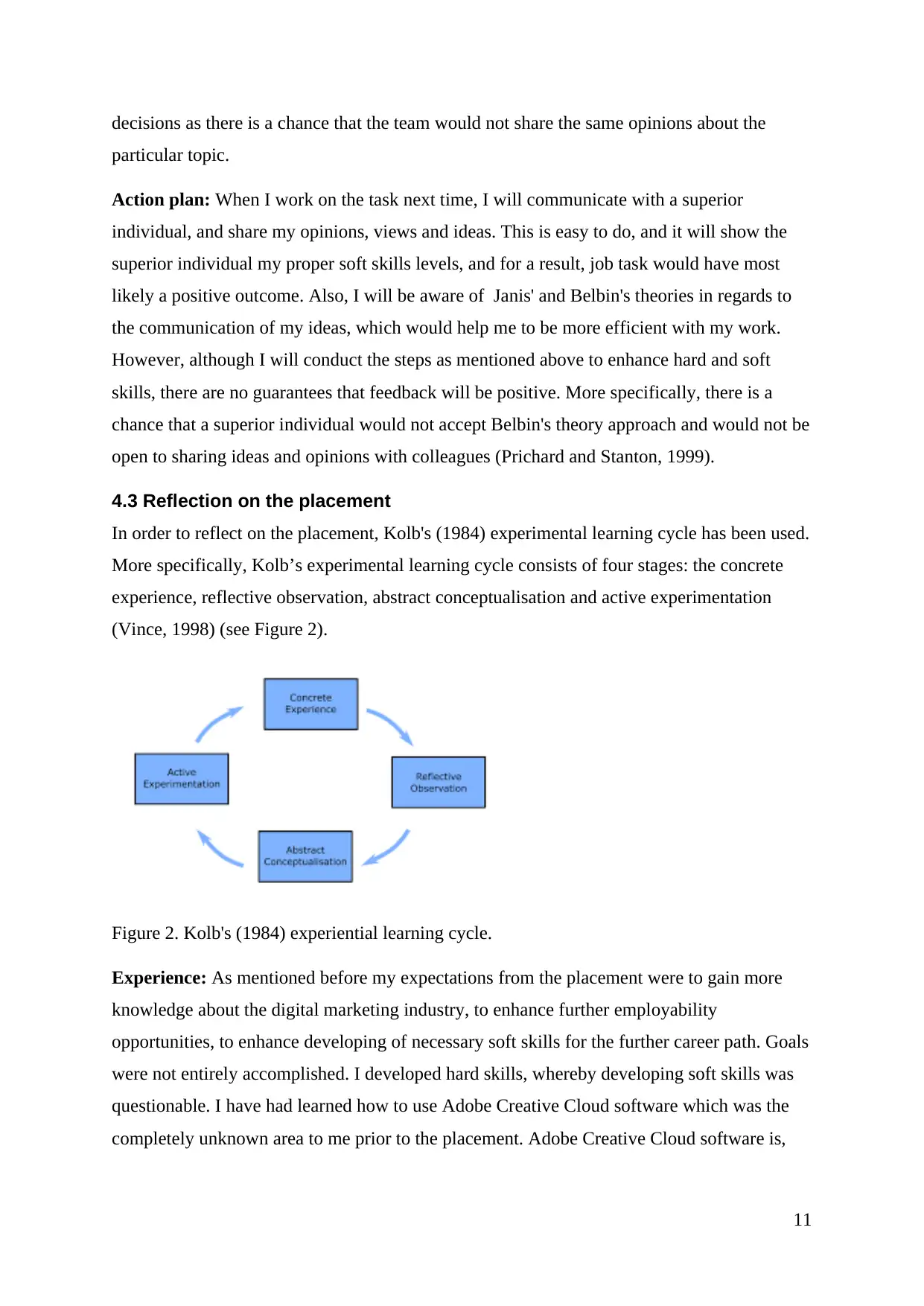
decisions as there is a chance that the team would not share the same opinions about the
particular topic.
Action plan: When I work on the task next time, I will communicate with a superior
individual, and share my opinions, views and ideas. This is easy to do, and it will show the
superior individual my proper soft skills levels, and for a result, job task would have most
likely a positive outcome. Also, I will be aware of Janis' and Belbin's theories in regards to
the communication of my ideas, which would help me to be more efficient with my work.
However, although I will conduct the steps as mentioned above to enhance hard and soft
skills, there are no guarantees that feedback will be positive. More specifically, there is a
chance that a superior individual would not accept Belbin's theory approach and would not be
open to sharing ideas and opinions with colleagues (Prichard and Stanton, 1999).
4.3 Reflection on the placement
In order to reflect on the placement, Kolb's (1984) experimental learning cycle has been used.
More specifically, Kolb’s experimental learning cycle consists of four stages: the concrete
experience, reflective observation, abstract conceptualisation and active experimentation
(Vince, 1998) (see Figure 2).
Figure 2. Kolb's (1984) experiential learning cycle.
Experience: As mentioned before my expectations from the placement were to gain more
knowledge about the digital marketing industry, to enhance further employability
opportunities, to enhance developing of necessary soft skills for the further career path. Goals
were not entirely accomplished. I developed hard skills, whereby developing soft skills was
questionable. I have had learned how to use Adobe Creative Cloud software which was the
completely unknown area to me prior to the placement. Adobe Creative Cloud software is,
11
particular topic.
Action plan: When I work on the task next time, I will communicate with a superior
individual, and share my opinions, views and ideas. This is easy to do, and it will show the
superior individual my proper soft skills levels, and for a result, job task would have most
likely a positive outcome. Also, I will be aware of Janis' and Belbin's theories in regards to
the communication of my ideas, which would help me to be more efficient with my work.
However, although I will conduct the steps as mentioned above to enhance hard and soft
skills, there are no guarantees that feedback will be positive. More specifically, there is a
chance that a superior individual would not accept Belbin's theory approach and would not be
open to sharing ideas and opinions with colleagues (Prichard and Stanton, 1999).
4.3 Reflection on the placement
In order to reflect on the placement, Kolb's (1984) experimental learning cycle has been used.
More specifically, Kolb’s experimental learning cycle consists of four stages: the concrete
experience, reflective observation, abstract conceptualisation and active experimentation
(Vince, 1998) (see Figure 2).
Figure 2. Kolb's (1984) experiential learning cycle.
Experience: As mentioned before my expectations from the placement were to gain more
knowledge about the digital marketing industry, to enhance further employability
opportunities, to enhance developing of necessary soft skills for the further career path. Goals
were not entirely accomplished. I developed hard skills, whereby developing soft skills was
questionable. I have had learned how to use Adobe Creative Cloud software which was the
completely unknown area to me prior to the placement. Adobe Creative Cloud software is,
11
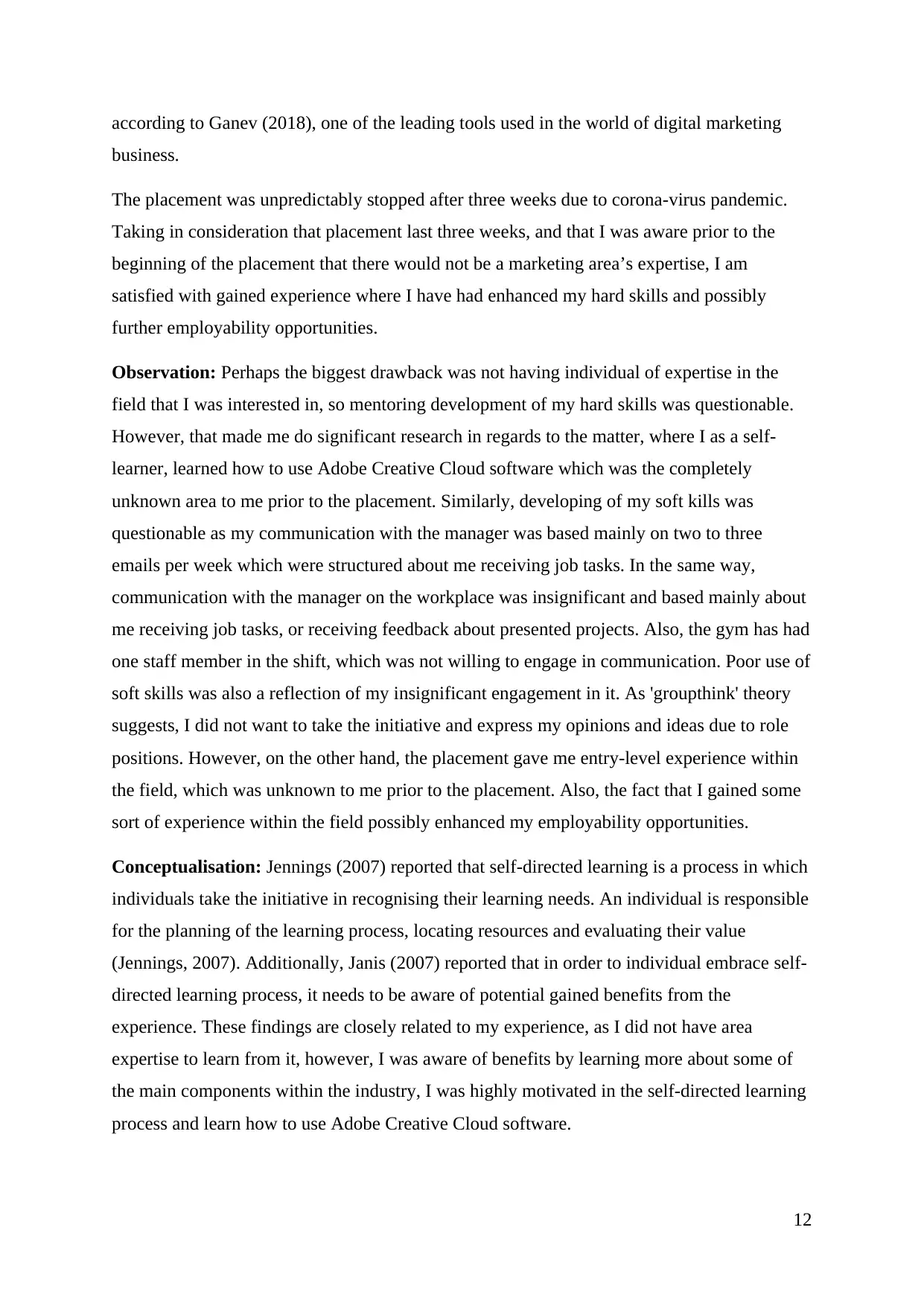
according to Ganev (2018), one of the leading tools used in the world of digital marketing
business.
The placement was unpredictably stopped after three weeks due to corona-virus pandemic.
Taking in consideration that placement last three weeks, and that I was aware prior to the
beginning of the placement that there would not be a marketing area’s expertise, I am
satisfied with gained experience where I have had enhanced my hard skills and possibly
further employability opportunities.
Observation: Perhaps the biggest drawback was not having individual of expertise in the
field that I was interested in, so mentoring development of my hard skills was questionable.
However, that made me do significant research in regards to the matter, where I as a self-
learner, learned how to use Adobe Creative Cloud software which was the completely
unknown area to me prior to the placement. Similarly, developing of my soft kills was
questionable as my communication with the manager was based mainly on two to three
emails per week which were structured about me receiving job tasks. In the same way,
communication with the manager on the workplace was insignificant and based mainly about
me receiving job tasks, or receiving feedback about presented projects. Also, the gym has had
one staff member in the shift, which was not willing to engage in communication. Poor use of
soft skills was also a reflection of my insignificant engagement in it. As 'groupthink' theory
suggests, I did not want to take the initiative and express my opinions and ideas due to role
positions. However, on the other hand, the placement gave me entry-level experience within
the field, which was unknown to me prior to the placement. Also, the fact that I gained some
sort of experience within the field possibly enhanced my employability opportunities.
Conceptualisation: Jennings (2007) reported that self-directed learning is a process in which
individuals take the initiative in recognising their learning needs. An individual is responsible
for the planning of the learning process, locating resources and evaluating their value
(Jennings, 2007). Additionally, Janis (2007) reported that in order to individual embrace self-
directed learning process, it needs to be aware of potential gained benefits from the
experience. These findings are closely related to my experience, as I did not have area
expertise to learn from it, however, I was aware of benefits by learning more about some of
the main components within the industry, I was highly motivated in the self-directed learning
process and learn how to use Adobe Creative Cloud software.
12
business.
The placement was unpredictably stopped after three weeks due to corona-virus pandemic.
Taking in consideration that placement last three weeks, and that I was aware prior to the
beginning of the placement that there would not be a marketing area’s expertise, I am
satisfied with gained experience where I have had enhanced my hard skills and possibly
further employability opportunities.
Observation: Perhaps the biggest drawback was not having individual of expertise in the
field that I was interested in, so mentoring development of my hard skills was questionable.
However, that made me do significant research in regards to the matter, where I as a self-
learner, learned how to use Adobe Creative Cloud software which was the completely
unknown area to me prior to the placement. Similarly, developing of my soft kills was
questionable as my communication with the manager was based mainly on two to three
emails per week which were structured about me receiving job tasks. In the same way,
communication with the manager on the workplace was insignificant and based mainly about
me receiving job tasks, or receiving feedback about presented projects. Also, the gym has had
one staff member in the shift, which was not willing to engage in communication. Poor use of
soft skills was also a reflection of my insignificant engagement in it. As 'groupthink' theory
suggests, I did not want to take the initiative and express my opinions and ideas due to role
positions. However, on the other hand, the placement gave me entry-level experience within
the field, which was unknown to me prior to the placement. Also, the fact that I gained some
sort of experience within the field possibly enhanced my employability opportunities.
Conceptualisation: Jennings (2007) reported that self-directed learning is a process in which
individuals take the initiative in recognising their learning needs. An individual is responsible
for the planning of the learning process, locating resources and evaluating their value
(Jennings, 2007). Additionally, Janis (2007) reported that in order to individual embrace self-
directed learning process, it needs to be aware of potential gained benefits from the
experience. These findings are closely related to my experience, as I did not have area
expertise to learn from it, however, I was aware of benefits by learning more about some of
the main components within the industry, I was highly motivated in the self-directed learning
process and learn how to use Adobe Creative Cloud software.
12
⊘ This is a preview!⊘
Do you want full access?
Subscribe today to unlock all pages.

Trusted by 1+ million students worldwide
1 out of 16
Related Documents
Your All-in-One AI-Powered Toolkit for Academic Success.
+13062052269
info@desklib.com
Available 24*7 on WhatsApp / Email
![[object Object]](/_next/static/media/star-bottom.7253800d.svg)
Unlock your academic potential
Copyright © 2020–2026 A2Z Services. All Rights Reserved. Developed and managed by ZUCOL.





